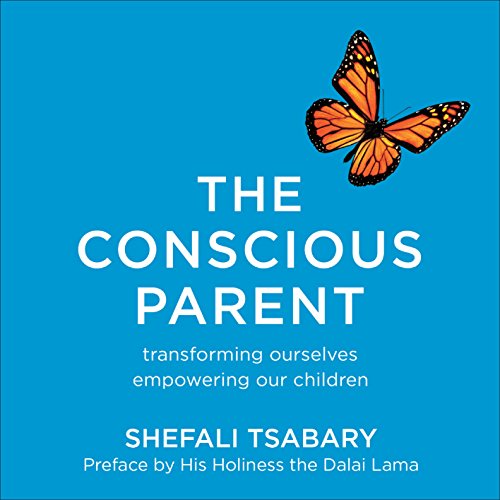The Conscious Parent by Shefali Tsabary - Book Review Part 1
04 Jan, 2021The Conscious Parent
I heard a segment of Shefali Tsabary on Russell Brands podcast Under the Skin and decided to read her book The Conscious Parent – transforming ourselves, empowering our children. Unlike other parenting books that tell parents how to ‘deal’ with difficult children and discipline them, The Conscious Parent focuses on what parents need to address in themselves, to be better parents to their children. It is based on the premise that children are inherently good and no child is seeking to be bad to hurt you or challenge you. They are ruled by their emotion and it is our job as parents to support them in their journey of self-regulation, understanding who they are and discovering their purpose in life.
She leads with the concept which may be controversial in some cultures that a child is a real person, just like you. For many parents, they may see a child as a malleable object – an extension of themselves – to be moulded and shaped into a mini-me. Unfortunately (or fortunately), children are little people in their own right with their own thoughts, feelings, ideas, ambitions and capability. It is tempting as parents to plan our children’s life for them, to envision a successful corporate career or a life as a homemaker in a nuclear family with 2.5 children and a dog. But forcing a child to realise your vision for them is only stopping them from realising their real purpose in life and finding what will truly make them happy.
Someone recently said to me that the only person who knows how to parent you, is yourself, and that is when youre much older in retrospect. No parent will know how to best parent a particular child – but I think this book is a great start.
Consciousness starts with you
The first few chapters of the book discuss what being a conscious parent is (how we parent everyday – there is no quick fix) and how parenting is a choice to bring a child into the world and be a facilitator or a guide to help them realise who they are and who they are meant to be. She asserts that a child is already born with a purpose and we are simply there to help them realise that. I don’t personally think that everyone has one purpose – we are all capable of many things and have many different paths we can explore but I understand her point. Often parents have a script they have written of their childs life before its even born. Its trying to step away from that.
She suggests that parents should look at parenting as an opportunity for spiritual growth – your child will teach you more about yourself than you could possibly teach it. Your child will reveal your ego – giving you a chance to recognise your need to be in control and let go of it. Your child will reveal your insecurities and childhood trauma, perhaps hurtful experiences from your own childhood you have repressed will come to light when your child behaves in a way that threatens to break the carefully constructed façade you have created of your life. You will only accept your child to the degree you accept yourself.
Another book I have read discusses the idea of resting in the space between thought and action – there is a pause before you react to something that gives you an opportunity to control the way you react. We may not have control over things that happen in our life, but we can control how we respond to it. This is something I am still working on every day, to rest in the space between thought and action. Shefali Tsabary shows how this relates to parenting in the chapter ‘Is your child growing you up?’ where she talks about facing up to your reactivity, and how to discover your emotional inheritance. Often parents cannot handle their child’s pain and seek to fix it straight away. Just as joy, happiness and pleasure are things a child should experience, so is pain, hurt, grief, guilt. It is important for a child to know that all emotions are okay and there is no need to run away from difficult emotions. It is okay to sit with the emotion and accept that you are feeling a certain way, and that this too shall pass. If you teach a child that sadness and pain or bad emotions that they should not be experiencing, how are they to handle these emotions as teenagers or adults? In the next chapter she steps through key lessons like your child doesn’t need to earn your trust – children are inherently good and they do not need to earn your trust, or approval or your praise. They are enough just by being themselves.
Parenting through the ages
The next two chapters of the book steps through parenting over a child’s lifetime, going from Infancy and the Terrible twos, to the school years. She discusses the lessons of infancy for the parent, how parenting is a journey of self discovery and a chance to recover your rhythm through the naturally slow pace of a child. Children can spend hours watching clouds, looking at puddles, and watching construction. Its an opportunity to let life slow down a little and live life at their pace. She explains that toddlerhood is the time to sow the seeds of containment – how to contain emotion and start self-regulating. Toddlerhood is a time to establish routines and have boundaries more firmly set so that they can separate further from their parents.
The school years are when a parent can really give a child an opportunity to grow spiritually, by offering them a grounded perspective of who they are and providing them support to test their sense of individuality, competence, worth and their limitations. It’s a time to be there for your children and be there to support them if they need it – but letting them lead the way. As your children experience a whirlwind of emotions, they need you to be constant, steady and providing the grounding support in their lives. She asserts that its important that you don’t try to fix their life – and allow them to make mistakes and learn to manage their emotions and create their own coping strategies.
This is something that a lot of parents seem to struggle with. It can be tempting as a parent to think I want my child’s life to be perfect, why should they have to make mistakes and learn from them – I can tell them what they should do so they need not make any mistakes. But it is so important for their development that they learn to make mistakes, and fail, and deal with failure as a child, so that when they experience failure as an adult, it is not an overwhelming whirlpool that sucks them in and they are unable to climb out of. Coming from an ethnic background, I believe that Asian and Indian parents try to shield their child from failure at the cost of their development of coping mechanisms to deal with failure and loss – which will certainly occur later in their lives.
High School is the time that your child needs unequivocal acceptance – this is when children are discovering their personality, their own attitudes and asserting their identity and it can be confronting for parents who have been used to meek mild submissive children suddenly come into themselves. The seeds you sowed when they were younger will now show how effective your parenting was:
‘If you were too strict with your children, the teen years are a time when they break free. If you were too permissive when your children were growing up, so that they failed to learn containment, they now go wild. If you were neglectful of your children or absent, they now refuse to connect with you.” If this is the case, a parent has to be willing to admit that they made a mistake and they were not there for their child, so they would like to be told what they need to do to repair the relationship. On the other hand maybe this is the time when you get to reap the fruits of your investment in your children.
She discusses why its important to resist the temptation to control – the time when they are going to seek our permission has passed – teens will do exactly what they wish, which is directly related to how they were raised. The only way to gain access to them is through rebuilding our lost connection.
Teens will shut you out if you don’t respect their need for privacy and space. She says that its only by providing a child total and unconditional acceptance in your daily presence and conversations with them that we encourage them to come to us when they need to. Your best chance of keeping your teens safe and empowered is to validate who they intrinsically are.
Get The Best Of Sleepy Roo Delivered To Your Inbox
Subscribe to my newsletter and get the latest info on baby sleep! You can unsubscribe at any time.



